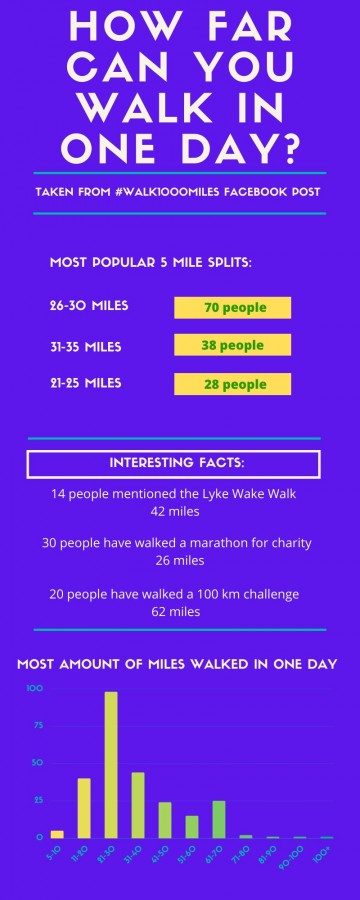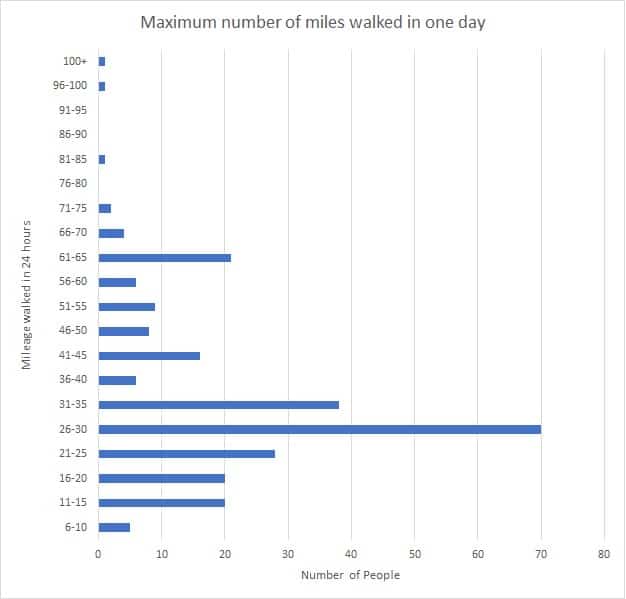Table of Contents
Some links on posts are affiliate links and will earn us a commission from qualifying purchases
I have mentioned before that in my teenage years I was a jogger, and in 1989 ran the London Marathon. So distances have always been a thing of interest for me. So I asked myself, what is the maximum walking distance per day that a person can manage. And actually how far should a person walk in one day – I feel these are two quite different questions.
How far should you walk in one day depends greatly on your starting fitness level. For someone who doesn’t walk generally, or is not very fit, I would suggest no more than 6 miles, and they would be hurting the next day. But if you do walk into double digit miles generally, a maximum mileage you should aim for would be 30 miles in one day. Although as you will see below, the World Record is a staggering 108.74 miles!
Starting level of fitness
Like all things, you need to build up if you want to walk long distances. I stated above that for someone who doesn’t walk generally they should do no more than 6 miles. But why did I choose that figure?
I have seen many people enter fun runs for charity, and generally speaking these are 5km or 10km. But because they have done no running before, they have walked them. Years ago I would have thought the silly for entering a fun run but not running, but as I get older then I can appreciate the fact that people are not all runners. It’s years since I have been able to run at any consistency, and I wouldn’t want to try at this moment!
But the fact that people want to raise money for charity at whatever level they can, I fully understand that they would be prepared to do this. At this time, in the middle of the coronavirus lockdown, raising money for the NHS seems almost essential. Of course, there are thousands of charities in the UK that all need our support.
If however you do walk regularly, then obviously you should be looking at further than this. If you are capable of double digit miles regularly, walking 10 or more, then you have probably considered doing a long distance walk over several days. As such, the question arises of how far should you be walking on each day.
I’ve stated a maximum of 30 miles in a day. Whilst people can and will walk more than this, my belief is that if you are walking at that level then this will have a great impact on your body. Especially if you are walking on consecutive days, you really don’t want to punish your body too much by walking greater distances, as you run the risk of serious injury, which will mean you need to rest up for at least a day and maybe weeks or months.
How many hours in a day are you walking?
Of course one of the major factors that comes into play on this topic is how many hours in a day are you going to be walking for? If you are setting off at dawn in summer and walking till dusk, then you could easily be walking for 16 hours. Unless you are walking in the dark, in winter you would have no chance of getting near this figure.
Of course, you don’t have to walk to those extremes either. When planning your long walks, you need to establish the amount of time in the day that you are prepared to walk for. If it is a one off day, then you may be prepared to do dawn to dusk to see what is possible.
I have a couple of friends who have done this. One of them, Darren, was a great fundraiser for charity, and was excellent at organising grand events. A few years ago he organised an event where people could enter and see how far they could walk around our nearby reservoir, Bewl Water. It’s a 13 mile trek round the whole reservoir, and a lovely walk – Nicky and I often take Paco there and have done the complete journey round a couple of times. My other friend Howard took part on at least two occasions. And one year he managed three times round, setting off at dawn and just finishing the third lap as dusk settled in. But boy did his feet know he’d overdone it.

If you are walking over several days then you need to think about other factors, such as planning your walks in advance so that you can easily reach your accommodation for the night before. You also need to factor in buying provisions, if need be – does your route pass through a village with a store that is open, or do you have to go off route to buy some food for your next day? In these circumstances you may wish to consider finishing a little earlier in the day.
4 Tips that affect the distance you can walk in a day
- Starting your hike early can make a significant difference. Cooler temperatures, fewer obstacles on the trail, and the potential for witnessing a sunrise can all contribute to a more enjoyable and productive day of walking.
- The ability to navigate efficiently can impact how far you can walk in a day. Skilled navigators who choose well-maintained and clearly marked trails might cover more ground than those who constantly struggle with directions or encounter frequent obstacles.
- The type of terrain plays a crucial role. Walking on a flat, well-maintained trail allows for a more consistent pace, while steep inclines, rough terrain, or dense vegetation can significantly slow down your progress. Keep this in mind when planning your walking distance.
- Weather conditions, especially extreme heat or heavy rain, can affect your endurance. High temperatures may necessitate more breaks and hydration, while rainy weather can create muddy and slippery trails, requiring extra caution and potentially reducing your overall walking distance. High winds are also a key factor, as I found out when walking the Seven Sisters on the South Coast.
Training for a long walk
Of course, you need to build up your level of fitness to achieve a greater distance. And what’s the best way of doing this? Whilst I have heard of people saying that you need to get in the gym and build up your strength and muscles, the best thing I have found is to just hike.
Muscle memory comes into play here, and the more you walk, the further you can walk. There’s something so simple about putting one foot on front of the other, however if you wish to do some strength work in the gym as well, then I am sure that would help.
Alternatively, especially if you are planning on a multi day trek, then you should just walk with a full rucksack. That way you get used to the weight as well as increasing the length of your walks as you go.
One of the best things to do to increase the length of your walks is to increase the speed that you walk at. Generally speaking I walk at about 20 minutes per mile, but if I put some effort in I can get that down. But at 3 miles per hour, even if I were to walk for 24 hours non-stop, I would only cover 72 miles – way off the world record. So you can see, that if you can walk quicker, you can cover a further distance in the same time.
Naismith’s Rule
In 1892 a Scottish mountaineer by the name of William Naismith calculated that every 3 miles walking on the flat would take 1 hour, and for every ascent of 2000 feet or 600 metres, you can add an hour to that time. This calculation accounts for a general level of fitness and reasonable walking terrain.
Of course, if you are having a comfortable walk, taking in the scenery, stopping to take pictures and to rest or eat regularly, then you may want to bring this figure down to 2 miles per hour. But in this scenario of walking the maximum amount of miles in one day, then it’s a good rule of thumb to follow.
You can see a more detailed description of Naismith’s Rule on Wikipedia here.
Guinness World Record
The Guinness World Record for the maximum distance walked in a 24 hour period was set in 2010 by former Nordic Walking World Champion Walter Geckle in his home country of Austria. He managed to walk a staggering 108.74 miles (175 km) in that time, which by my calculations equates to an astonishing 13 minutes 15 seconds per mile.
Simon Hartley – 100 miles in 24 hours
In my research I found this video on YouTube from Simon Hartley. He’s a business coach and I guess regular walker, so peak performance is his thing. He set out at 9pm to see how far he could walk in 24 hours, walking laps of a route near his house, but aiming for 100 miles. After 30 miles in 7 hours he was aching all over, but he still had a long way to go.
Halfway through he stopped at his house to change clothes, to have a light meal and something to drink, but as you will see after this stop he found it really hard to get going again and was really stiff, his body threatening to give up. But using his performance mindset he managed to complete the 100 miles with 17 minutes to spare! Well worth 4 minutes of your time watching.
#Walk1000miles Facebook question

In August 2020 Gemma Williams posted in the #walk1000miles Facebook Group the following question:
What is the furthest anyone has walked in one day?
The other walkers within the group responded and I’ve summarised below their findings in the chart. (The sample was taken from 256 replies within the first couple of days).
As you can see, there was a wide variety of mileage recorded as the maximum the other members had walked in a day.
What became clear is that many people could remember that they did a certain walk, such as the Lyke Wake Walk at 42 miles, or that they had partaken in another challenge, such as a marathon at 26 miles or a 100km challenge (62 miles).
Obviously there were others who just remembered walks that they had taken on their own or with friends too, but that they easily remembered their longest walk.

Conclusion – What is the maximum walking distance per day?
As you have seen, your own maximum walking distance depends greatly on your starting level of fitness. But whether you can walk a maximum of 6 miles or maybe 30 miles, there is always someone who can walk further. The most important thing is to increase your mileage so that you meet the goal that you want to achieve, but doing so with enjoyment. The most important thing is to be happy whilst you walk, and to benefit from nature all around you.
What Next?
17 tips to keep you motivated on long walks
Some long distance multi-day walks you may want to try
Recent Posts
Hike Smarter: Hiking Apps to Plan Your Next Adventure for 2025
Planning a great hike means having the right tools. The best apps combine maps, route details, weather forecasts, and safety features to make your trip easier and safer. They help you find trails,...
Heading out for a hike? The weather can be your best friend or your worst enemy. Knowing what the sky has in store for you is vital for a safe and enjoyable trip. Being prepared for sudden changes,...


